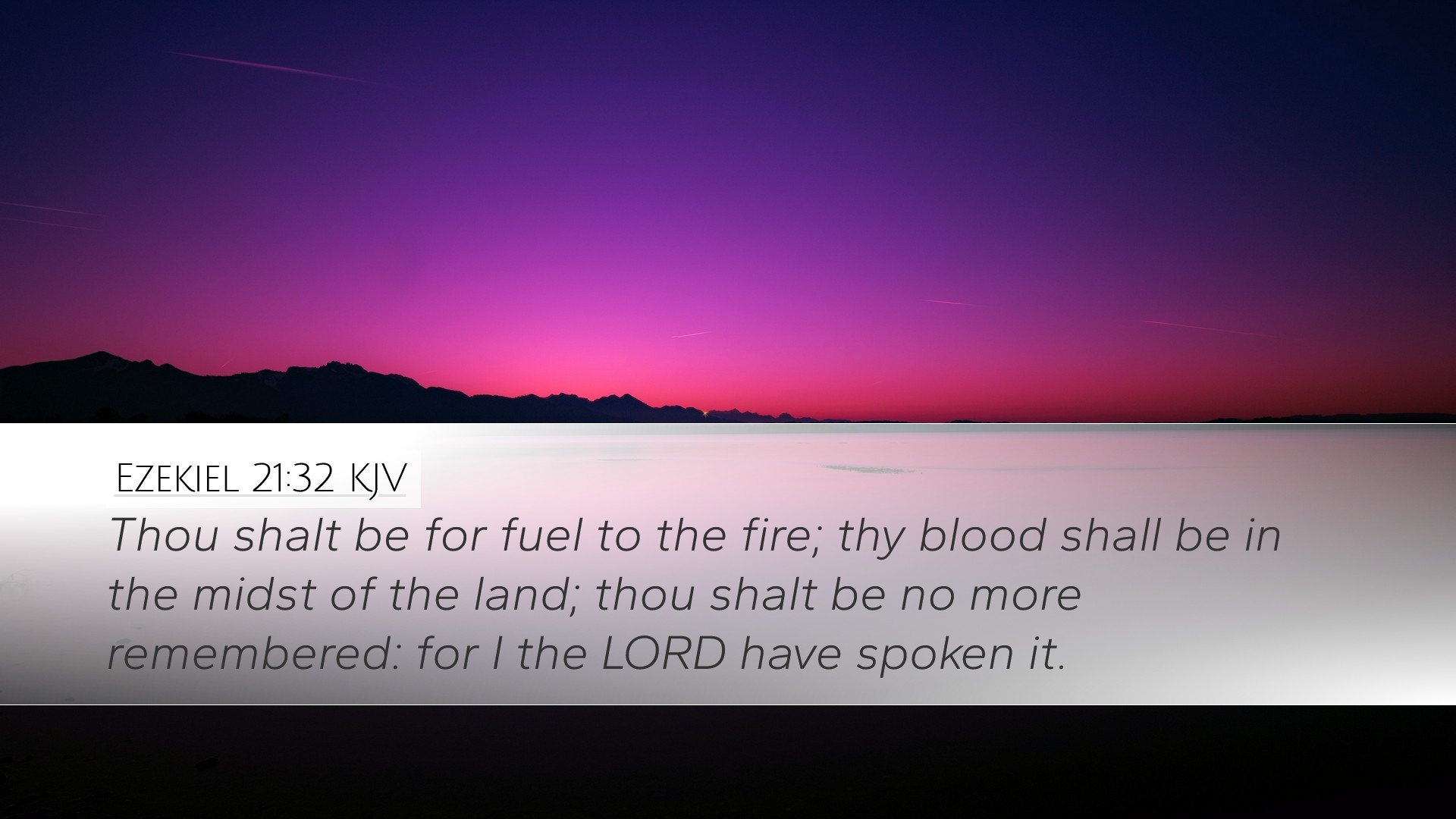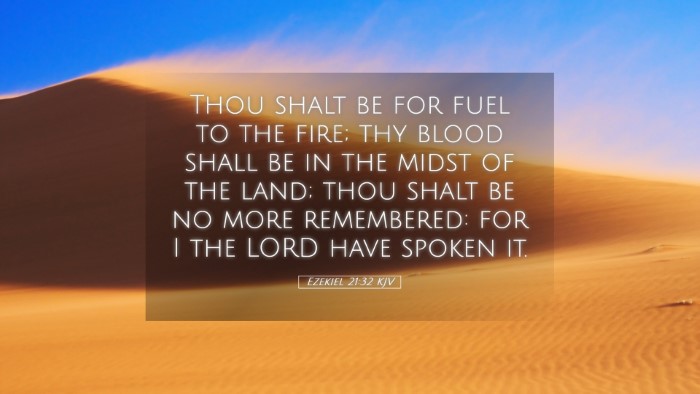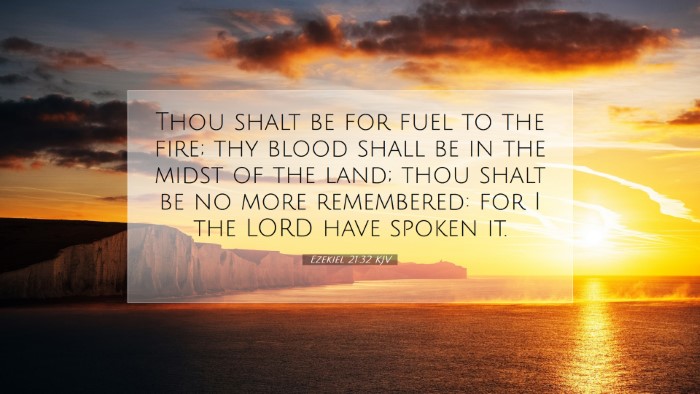Ezekiel 21:32 - Commentary
Ezekiel 21:32 states, "Thou shalt be for fuel to the fire; thy blood shall be in the midst of the land; thou shalt be no more remembered: for I the Lord have spoken it." This verse brings forth profound themes of judgment, finality, and the sovereign declaration of God’s word. Below is a compilation of insights from prominent public domain commentators for a deeper understanding.
Overview of Ezekiel's Prophecy
Ezekiel, a prophet during the Babylonian exile, frequently delivered messages of impending judgment against Israel and the nations surrounding them. His prophecies often serve as both stark warnings and profound metaphysical insights into God's dealings with humankind.
Contextual Analysis
This verse is part of a larger section where God communicates His judgment against Israel's leaders and the nation for their idolatry and injustice. It reflects the catastrophic consequences of Israel's disobedience and serves to underscore the seriousness of abandoning God's covenant.
- Prophetic Judgment: The imagery of being "for fuel to the fire" illustrates total destruction and the severe consequences of rebellion against God (Henry).
- Blood in the Midst: The references to blood suggest a deep spiritual and moral decay within the nation, representing not just physical destruction but the loss of life, hope, and identity (Barnes).
- Divine Finality: The phrase "thou shalt be no more remembered" indicates a complete erasure of both the nation’s legacy and its people from the annals of history, showing the seriousness of God’s decree (Clarke).
Commentary Insights
Matthew Henry's Commentary
Matthew Henry emphasizes the certainty and severity of God’s judgment. He notes that the phrase "fuel to the fire" not only implies destruction but signifies a judgment ordained by God. Henry comments on the absolute nature of God's word, indicating that once spoken, how it shall surely come to pass. He expounds that this judgment is a manifestation of God’s righteous anger towards those who reject His ways. The finality of the decree serves as a lesson for all generations about the importance of remaining diligent in faithfulness.
Albert Barnes' Analysis
Albert Barnes places a significant focus on the symbolism of "blood" and its implications. He interprets the imagery as a representation of the life force now wasted and lost due to sin. Barnes articulates how the shedding of blood was indicative of grave sins and the resultant loss of God’s favor. He highlights that the mention of remembrance underscores the idea that nations and individuals can fall into oblivion as a consequence of turning away from divine alliance. The prophetic word serves a dual purpose of warning and finality, emphasizing the determinism in God’s judgment process.
Adam Clarke's Perspective
Adam Clarke reflects on the broader implications of the prophetic declaration. He discusses the societal implications of the judgment where "fire" symbolizes purification and destruction. Clarke notes that God’s mention of obliteration "no more remembered" speaks not only to Israel's fate but serves as a cautionary message to future generations regarding the consequences of persistent rebellion. He highlights the importance of adhering to God’s commandments and the dangers involved in corporate and individual apostasy.
Theological Implications
This verse encapsulates theological reflections that resonate across scriptural narratives and ecclesiastical teachings:
- Sovereignty of God: The passage underscores God’s ultimate authority in administering justice and making irrevocable decisions regarding nations and individuals.
- The Weight of Sin: It reminds believers of the seriousness of sin and the potential consequences of turning away from divine truth and moral righteousness.
- Hope amid Judgment: Even within the context of judgment, the narrative of Ezekiel carries the potential for restoration, urging understanding of God’s redemptive character post-judgment (as seen in subsequent chapters).
Application for Today's Believers
For pastors, theologians, and students of the Bible, the contemplations drawn from Ezekiel 21:32 provide relevant insights into contemporary faith practices:
- Examine Personal and Corporate Faithfulness: Reflect on the commitments to live in accordance with God’s word to stave off spiritually destructive judgments.
- Recognize the Power of Repentance: The imagery serves as an invitation to turn back to God, emphasizing His readiness to forgive and restore.
- Communicate Warnings: Equip congregations with messages that sound alarm bells regarding moral laxity and the necessity of upholding truth in both personal and communal contexts.
Conclusion
In conclusion, Ezekiel 21:32 serves as a compelling reminder of the overarching themes of divine justice, the destructiveness of sin, and the possibility of redemption. Engaging with the interpretations of Matthew Henry, Albert Barnes, and Adam Clarke allows one to grasp the depth of God’s socio-spiritual dealings with His chosen people. Subsequent generations are urged to heed these insights to navigate faith with reverence and fidelity.


